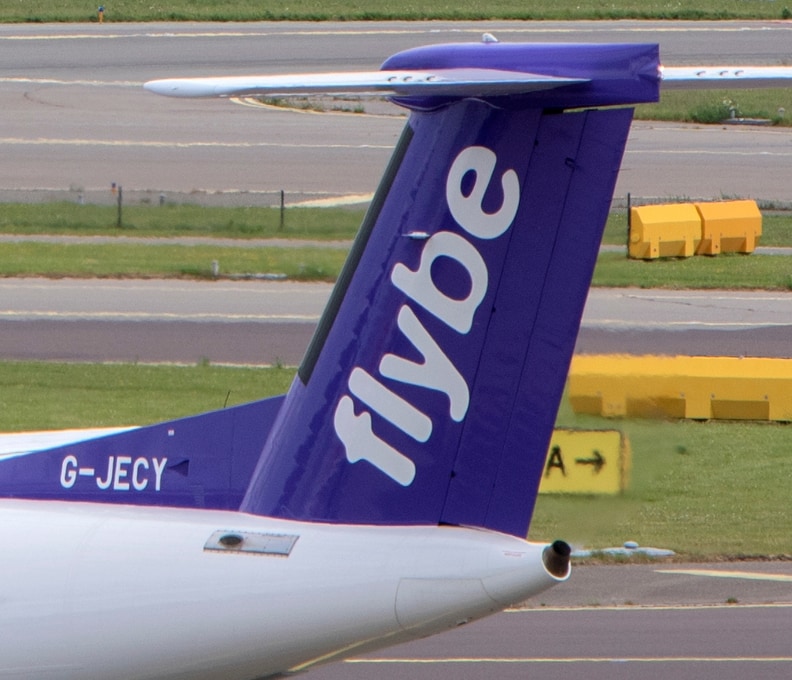U.K. Regional Airline Flybe Goes Into Administration
The regional carrier folded over the weekend, affecting an estimated 75,000 passengers, although other airline's have been quick to try and snap up affected staff
by Lauren Smith
January 31, 2023

U.K. Regional Airline Flybe / Photo: Dutchmen Photography_Shutterstock.jpg
Passengers were stranded and left out of pocket when regional U.K. airline Flybe folded over the weekend, less than a year after it resumed operations. But over 300 impacted workers may have soft landings as other airlines scramble to snap them up.
Flybe confirmed on Saturday morning that all flights to and from the U.K. had been canceled and would not be rescheduled. As a result, an estimated 75,000 ticket holders, including 2,500 who had been due to fly that day, have been impacted.
The U.K. Civil Aviation Authority (CAA) urged customers with tickets for Flybe flights to avoid traveling to airports.
“Flybe customers who still need to travel will need to make their own alternative travel arrangements via other airlines, rail, or coach operators,” it said.
Consumers in the U.K. have few avenues for redress when an airline goes bust. Unlike when an operating airline axes departures, they won’t be offered refunds or booked onto different flights.
Those who bought Flybe tickets with credit cards can legally claim refunds from their card provider under section 75 of the Consumer Credit Act. However, the protection only covers purchases of £100 or more, excluding some who took advantage of Flybe’s low fares.
Passengers who booked tickets with debit cards can try to claim from their card providers through the chargeback system but are not guaranteed refunds.
Travel insurance may provide another safety net: around half of the policies sold in the U.K. offer scheduled airline failure cover (SAFI) as standard.
The CAA said passengers who purchased tickets through an intermediary such as a travel agent should contact that third party first.
“It is always sad to see an airline enter administration, and we know that Flybe’s decision to stop trading will be distressing for all of its employees and customers,” said CAA consumer director Paul Smith.
Flybe previously ceased trading in March 2020, citing the coronavirus pandemic. It was rescued the following year by Thyme Opco, a firm connected to U.S. hedge fund Cyrus Capital.
The new Flybe Limited launched last April, with plans to operate up to 530 flights per week on 23 routes, including to and from Birmingham (BHX), Belfast City (BHD), Glasgow (GLA), Aberdeen (ABZ), Edinburgh (EDI), Inverness (INV), Leeds Bradford (LBA), East Midlands (EMA), London Heathrow (LHR), and Southampton (SOU). In addition, international destinations included Amsterdam (AMS), Avignon Provence (AVN), Brest Bretagne (BES), and Toulon Hyères (TLN).
However, industry observers said the relaunched Flybe struggled to capitalize on the recent resurgence in air travel demand. Its routes were limited, and a delay in the delivery of 17 leased aircraft prevented it from expanding its schedule.
But a robust market will help the 321 Flybe staff who have been left without jobs. Competitors Ryanair and easyJet have already moved to recruit cabin crew and ground staff from Flybe’s ranks.
Ryanair has set up a fast-track recruitment process for former Flybe employees and will hold a recruitment event at Birmingham Airport, the former Flybe hub, on February 2. Addressing Flybe employees on its website, the airline said it has “positions for all of you, across all areas of our business, including flight crew, cabin crew, engineers, ground staff and office staff.”
easyJet isn’t currently recruiting pilots but encouraged Flybe cabin crew to apply for its 250 vacancies at Gatwick (LGW) and Luton (LTN) airports. Flybe employees would be fast-tracked through the recruitment process in ten days and could start work within ten weeks, easyJet said.
Some Flybe staff previously lost their jobs when the airline first folded in 2020, shedding 2,000 jobs. But their experience should be different this time, said Martin Chalk, head of the British Airline Pilots Association (BALPA).
“Of course, there is upset and concern,” he said. “The advantage is, this time around, the market is somewhat more buoyant than it was, now that Covid is largely in the rearview mirror.”
Airlines are also keen to avoid the chaos of last year when staff shortages led to thousands of flight cancellations and huge compensation bills owed to passengers.



